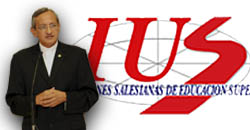

| RMG – The work of the VI IUS Assembly comes to an end |
| RMG – VI Assembly of the IUS: constant search for quality in the Salesian Universities |
(ANS – Rome) – Yesterday morning 11 July the Rector Major spoke at the VI Assembly of the Salesian Institutes for Higher Education (IUS). His talk, entitled – ‘The Salesian Perspective on a Presence in Higher Education, was an analysis of the current educational scene, a proposal for a way out of the present educational crisis and finally a reflection on educating today.
Fr Chávez began referring to the liturgical feast of the day: Saint Benedict. The monastic tradition which he began expressed in those places which were central to a monastery an holistic view of mankind: the church (God in the first place), the library (culture and religion), the refectory (fraternal life), the garden and the fields (daily work) and then the great universities (education). “So, we need places of a living and open culture which are a help in understanding the processes of change taking place.”
“For many years the Church has forcefully put the question of education at the centre of its activities. But the task of training the young in an holistic humanism runs the risk of being replaced by models which put the useful in the place of good and personal taste in the place of beauty.”
The educational emergency is “not a crisis of educational techniques or of university systems. Education is much more than a technique, Don Bosco loved to say ‘it is a question of the heart.’ It is primordial process, similar to gestation because it is a new man a new women coming to birth. Above all education leads to an awareness of ourselves (who we are); to an ability to form relationships also with culture; to freedom and to responsibility. It is a question of the formation of individuals, of professionals, of citizens.”
The crisis of the family, difficulties with the school or university system and the speed of change, of the conditions within which life is lived are factors which accompany the educational emergency. To these can be added another which the Rector Major considers a profound and determining factor: the crisis of culture and of anthropology. It is marked by two stages: the division between the “objective” world of reason and the “subjective” and emotive world of feelings and affections; and the reduction of expressions in the emotional, affective and moral spheres, including that of freedom, to purely cerebral, electrochemical activities and processes which can be artificially reproduced. Both these stages diminish and reduce education, and consequently the value of the individual.
“Today the IUS are necessary even more than 12 years ago when the network of university centres was set up,” Fr Chávez said, “because there is the need to make a cultural contribution and not a simple transmission of know-how.”
Regarding the educational emergency – a diagnosis of which Benedict XVI has already made– the Rector Major offers some suggestions as to a way out or at least a holding measure. “If the problem is anthropological, the first cure has to be anthropological, cultural. We need to rediscover the original purpose of the school, aimed at the process of becoming more human. The first school in ancient Greece was called “Paideia”, that is the art which assists the child in becoming fully a man; in the Roman period it was called “Humanitas”, the art of becoming more human; in the IV century “Divinitas”, the art which brings man to the fullness of God.”
Starting from the experience of Don Bosco, Fr Chávez pointed out, how, as in the sporting world, there are some fundamentals of education: “Wanting the best for the person we are educating. There is no need to avoid the questions or the worries of the students, those explicitly expressed and those implicit. There is a need to combine the discipline which forms character with freedom, and to help the young to take on board the risks which go with being free. Finally, not sparing the young from the suffering that is part of life.”
The “teacher” has a special role. “for this reason it is important to take care of the training of teachers: many teach but few educate! To educate means to propose truth, to communicate values, to point out ideals in life, to propose ways of communal life which go beyond economics and politics.”
What is education and who are the educators? Recent history in the world has provided two different kinds of answer to this question: one technical and the other ideological. But what is clear is that neither the technical, nor the ideological free man from the task of discovering the meaning of being human nor do they automatically give him the inner strength to achieve his personal destiny.
“The new world is an admirable conquest of science, of the desire for concord and the defence of human rights for all. But these achievements and conquests bring with them new problems, challenges and responsibilities which require many unimaginable tasks for education:
To the representatives of the IUS he then said: “We will be able to produce something new if we give attention to our theoretical, historical and civil tasks. It is my hope that our universities will truly be centres of education. We need high quality personnel, proposals and social breadth in the service of humanity.”
Published 12/07/2012
